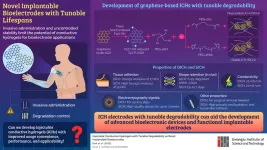(Press-News.org) New Haven, Conn. — When it was launched in April 2003, the Human Genome Project helped revolutionize biomedical research by providing scientists a reference map that allowed them to analyze DNA sequences for genetic clues to the origins of a host of diseases.
Twenty years later, a team of researchers that includes Yale scientists has created a new “pangenome” that fills in missing sequencing gaps from the original genome project and greatly expands the diversity of genomes represented.
The achievement is described in a paper published May 10 in the journal Nature, one of six papers on the pangenome project published simultaneously in Nature journals.
“The new reference information is much richer and improves our ability to analyze human genomes for the purposes of drug discovery, disease diagnosis, and genome-guided precision medicine,” said Ira Hall, a professor of genetics at Yale School of Medicine and director of the Yale Center for Genomic Health, who is one of five co-corresponding authors of the paper.
The project was conducted by the Human Pangenome Reference Consortium, a project funded by the National Human Genome Research Institute to sequence and assemble genomes from individuals from diverse populations. Relying on a single reference genome, the group says, creates reference biases and undermines discoveries of variants, associations between genes and disease, and the accuracy of genetic analyses.
The new pangenome incorporates complete DNA data collected from 47 individuals representing every continent with the exception of Antarctica. It not only incorporates more diverse genetic sequences but also adds 119 million base pairs — the building blocks of DNA — to the library of 3.2 billion previously known base pairs that make up the human genome.
The higher quality and depth of data in the pangenome reference will help clinicians better pinpoint potentially dangerous variants within an individual patient’s DNA, the researchers say.
“The inclusion of diverse human populations in this project ensures that the medical advances enabled by the pangenome will benefit all ancestry groups in an equitable way,” Hall said.
Eventually, the Human Pangenome Reference Consortium hopes to add complete genetic data on 350 individuals to its reference database.
The project is funded by the National Institutes of Health.
Yale’s Wen-Wei Liao is a co-first author of the paper. Erik Garrison, of the University of Tennessee, Tobias Marschall of Heinrich Heine University, Heng Li of Harvard University and Benedict Paten of University of California Santa Cruz along with Hall are co-corresponding authors.
END
New ‘pangenome’ offers more inclusive view of human genome
2023-05-10
ELSE PRESS RELEASES FROM THIS DATE:
Study: palliative care provided at point of oncology surgery does not improve patient outcomes
2023-05-10
One of the most important advances in palliative care in oncology over the past 15 years has been the recognition that palliative care specialists can improve cancer patients’ outcomes well before their end of life.
Palliative care is specialized care provided to individuals with a serious illness that focuses on decision-making support, pain and symptom management, as well as psychosocial interventions to improve quality of life.
Several past randomized clinical trials have shown palliative care specialists can improve the quality of life and lengthen the ...
Investigating social media to evaluate emergency medicine physicians’ emotional well-being during COVID-19
2023-05-10
About The Study: In this study, key thematic shifts and increases in language related to anxiety, anger, depression, and loneliness were identified in the content posted on social media by academic emergency medicine physicians and resident physicians during the pandemic. Social media may provide a real-time and evolving landscape to evaluate thematic content and linguistics related to emotions and sentiment for health care workers.
Authors: Anish K. Agarwal, M.D., M.P.H., M.S., of the ...
Analysis of BMI in early and middle adulthood and estimated risk of gastrointestinal cancer
2023-05-10
About The Study: In this secondary analysis of the Prostate, Lung, Colorectal, and Ovarian Cancer Screening Trial, overweight and obese body mass index (BMI) in early and middle adulthood was associated with an elevated risk of colorectal cancer and non-colorectal gastrointestinal cancers. The results of the current study prompt further exploration into the mechanistic role of obese BMI in carcinogenesis.
Authors: Holli A. Loomans-Kropp, Ph.D., M.P.H., of Ohio State University in Columbus, is the corresponding author.
To access the embargoed study: Visit our For The Media website at this link https://media.jamanetwork.com/
(doi:10.1001/jamanetworkopen.2023.10002)
Editor’s ...
UW Medicine scientists among leads of NIH pangenome studies
2023-05-10
UW Medicine genome experts made significant scientific contributions to a National Institutes of Health Human Genome Research Institute reference collection that better represents the genetic diversity of the world’s populations.
Called the Human Pangenome Reference Consortium, the multi-institutional effort expands and updates earlier work that started as the Human Genome Project. That original project, with drafts reported in 2001 and 2003, was based on a more limited sampling of human DNA. The goal then was to create an entire sequence of a human genome to use as a reference. ...
The clearest snapshot of human genomic diversity ever taken
2023-05-10
For more than 20 years, scientists have relied on the human reference genome, a consensus genetic sequence, as a standard against which to compare other genetic data. Used in countless studies, the reference genome has made it possible to identify genes implicated in specific diseases and trace the evolution of human traits, among other things.
But it has always been a flawed tool. One of its biggest problems is that about 70 percent of its data came from a single man of predominantly African-European background whose DNA was sequenced during ...
Researchers measure the light emitted by a sub-Neptune planet’s atmosphere for the first time
2023-05-10
For more than a decade, astronomers have been trying to get a closer look at GJ 1214b, an exoplanet 40 light-years away from Earth. Their biggest obstacle is a thick layer of haze that blankets the planet, shielding it from the probing eyes of space telescopes and stymying efforts to study its atmosphere.
NASA’s new James Webb Space Telescope (JWST) solved that issue. The telescope’s infrared technology allows it to see planetary objects and features that were previously obscured ...
Paper refutes assertion that effects of bottom trawling on blue carbon can be compared to that of global air travel
2023-05-10
A ‘Matter Arising’ paper published in Nature today refutes the findings of a paper by Sala et al on the amount of CO2 released from the seabed by bottom trawling. The paper made significant headlines around the world on release in 2021, as it equated the carbon released by bottom trawling to be of a similar magnitude to the CO2 created by the global airline industry.
In their paper quantifying the carbon benefits of ending bottom trawling, Prof Jan Hiddink of Bangor University’s world-renowned School of Ocean Science and others, explain that the methodology ...
Gwangju Institute of Science and Technology researchers develop injectable bioelectrodes with tunable lifetimes
2023-05-10
Implantable bioelectrodes are electronic devices that can monitor or stimulate biological activity by transmitting signals to and from living biological systems. Such devices can be fabricated using various materials and techniques. But, because of their intimate contact and interactions with living tissues, selection of the right material for performance and biocompatibility is crucial. In recent times, conductible hydrogels have attracted great attention as bioelectrode materials owing to their flexibility, compatibility, and excellent interaction ability. However, the absence ...
Study of cancer metastasis, most common cause of cancer death, gets $35 million boost at Johns Hopkins Medicine
2023-05-10
FOR IMMMEDIATE RELEASE
With a $35 million gift from researcher, philanthropist and race car driver Theodore Giovanis, scientists at Johns Hopkins Medicine will study the biological roots of the most fatal aspect of cancer: how it metastasizes, or spreads, through the body.
The contribution, a 15-year commitment, will establish the Giovanis Institute for Translational Cell Biology, dedicated to studying metastasis. The institute’s researchers aim to make discoveries that reveal common features of metastasis across cancer types, ...
Pandemic stress reshapes the placentas of expectant moms
2023-05-10
WASHINGTON (May 10, 2023) – Elevated maternal stress during the COVID-19 pandemic changed the structure, texture and other qualities of the placenta in pregnant mothers – a critical connection between mothers and their unborn babies – according to new research from the Developing Brain Institute at Children’s National Hospital.
Published in Scientific Reports, the findings spotlight the underappreciated link between the mental health of pregnant mothers and the health of the placenta – a critical organ ...




